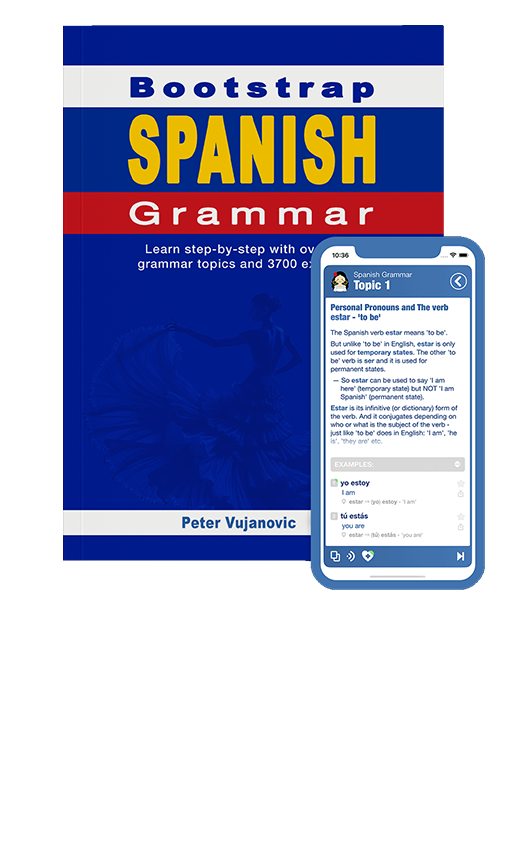Spanish grammar - The present perfect tense and past participles |
|||
|
|||
The 'present perfect tense' (El pretérito perfecto compuesto) is used to describe actions that have occurred at some point in the past but are still relevant or connected to the present moment. It is formed by combining the present tense of the auxiliary verb haber with the 'past participle' of the main verb. -- This is similar to its constuction in English - for example 'I have eaten' or 'He has left'. The past participle is created by adding -ado to the stem of -AR verbs and -ido to the stem of -ER and -IR verbs. There are also some irregular past participles which are covered in the next topic. The past participle remains the same regardless of the subject - it does not have to agree in gender and number. |
| Examples: | |
|
¿Has hablado con María?
Have you (familiar) spoken with María?
|
|
|
He comido toda la pizza, pero todavía tengo hambre.
I have eaten all the pizza, but I am still hungry.
|
|
|
¿Ha vivido en Madrid cinco años?
Has he/she/you (formal) lived in Madrid for five years?
|
|
|
Hemos terminado el trabajo y ahora podemos descansar.
We have finished the work and now we can rest.
|
|
|
Habéis estudiado mucho, ¿verdad?
You all (familiar) have studied a lot, right?
|
|
|
He corrido tres millas hoy, así que estoy cansado.
I have run three miles today, so I am tired.
|
|
|
No he aprendido nada nuevo en clase todavía.
I have not yet learned anything new in class.
|
|
|
He vendido mi coche y ahora uso el transporte público.
I have sold my car and now I use public transportation.
|
|
|
¿Ha vivido tu abuela aquí durante mucho tiempo?
Has your grandmother lived here for a long time?
|
|
|
No he cocinado la cena todavía.
I have not yet cooked dinner.
|
|
|
¿Habéis lavado el coche hoy?
Have you all (familiar) washed the car today?
|
|
|
No he bebido suficiente agua hoy todavía.
I have not yet drunk enough water today.
|
|
|
¿Has viajado a muchos países?
Have you (familiar) traveled to many countries?
|
|
|
Hemos recibido la carta y la hemos leído.
We have received the letter and we have read it.
|
|
|
¿Has aprendido español en la escuela?
Have you (familiar) learned Spanish at school?
|
|
|
No he vivido en esta ciudad mucho tiempo todavía.
I have not yet lived in this city for a long time.
|
|
|
¿Has subido la montaña alguna vez?
Have you (familiar) ever climbed the mountain?
|
|
|
He completado el proyecto y estoy satisfecho.
I have completed the project and I am satisfied.
|
|
|
No he aceptado la oferta de trabajo todavía.
I have not yet accepted the job offer.
|
|
|
He recibido noticias recientes y estoy emocionado.
I have received recent news and I am excited.
|
|
 |
|




